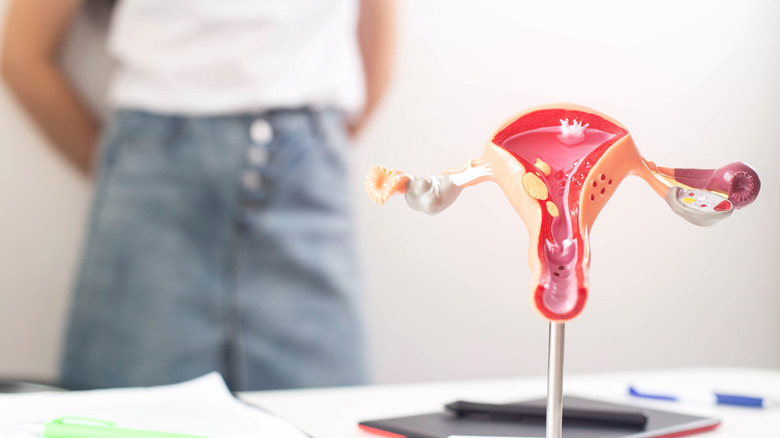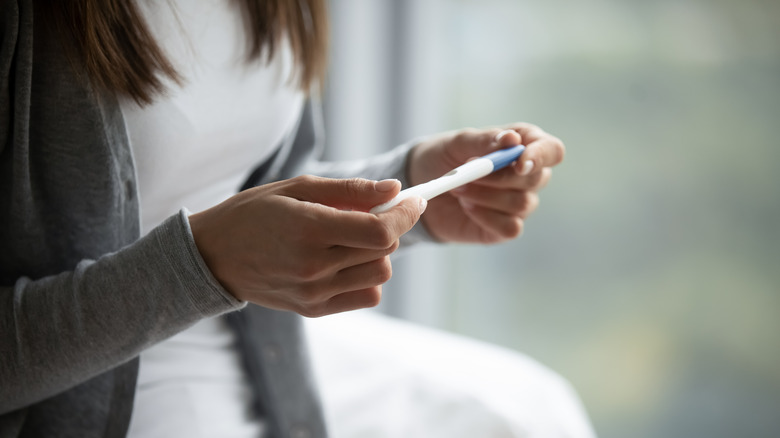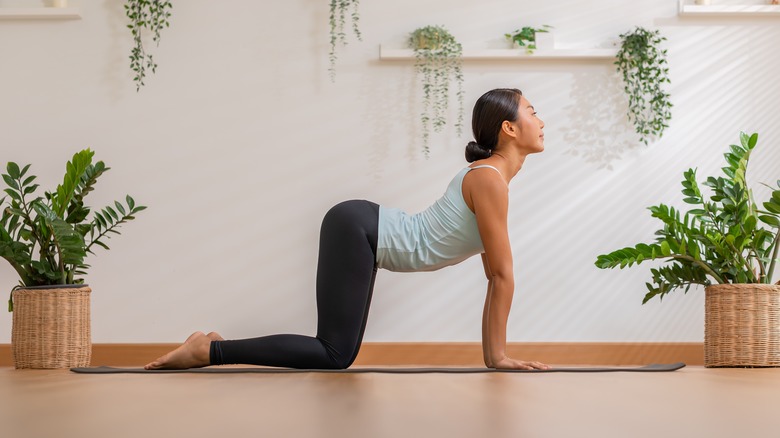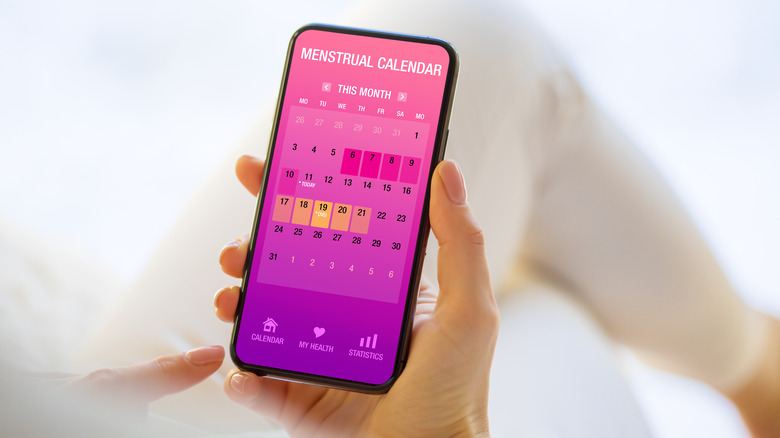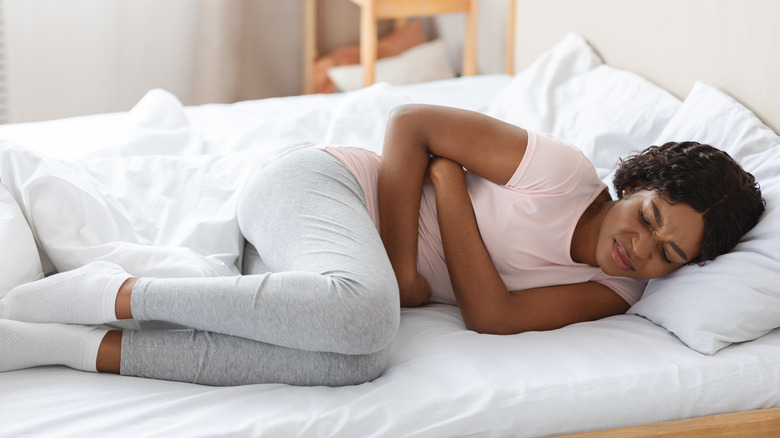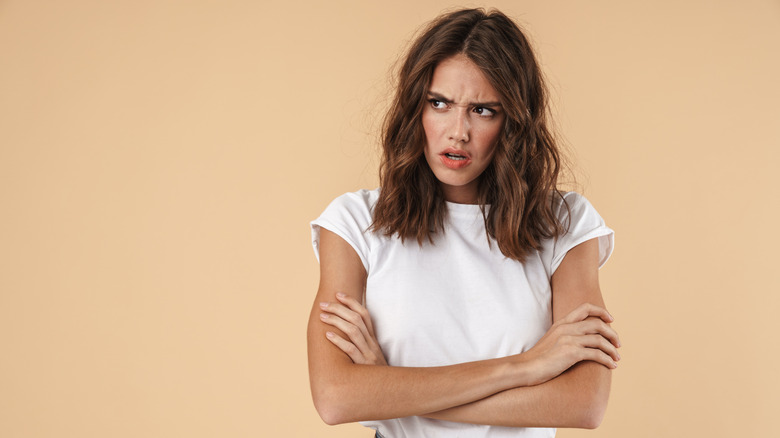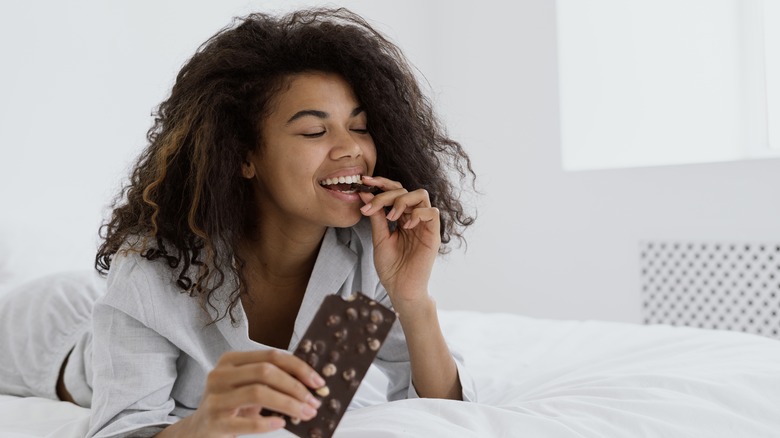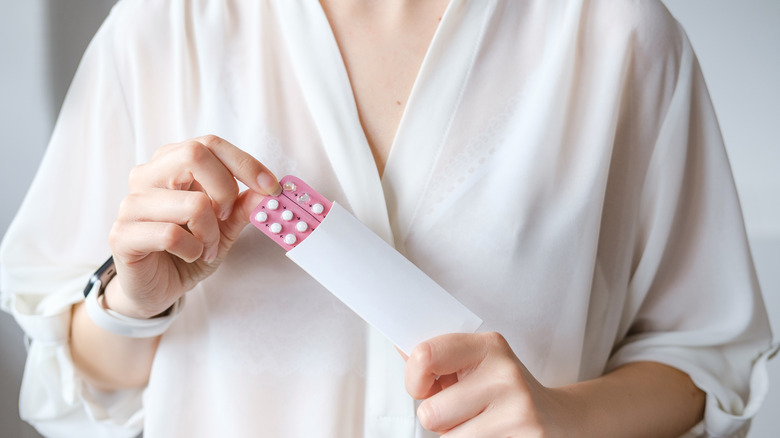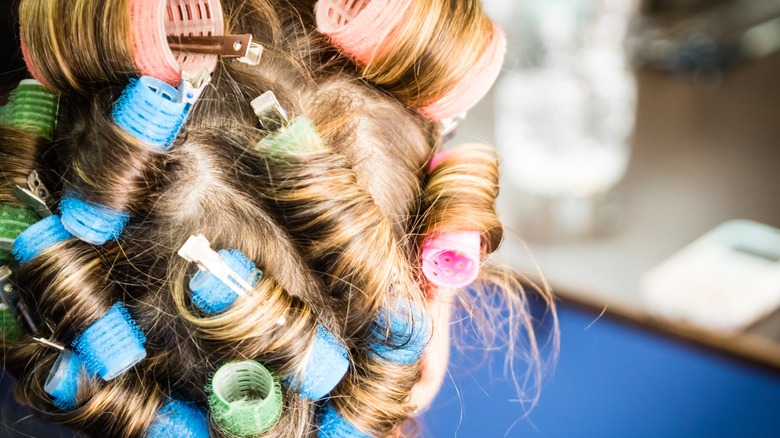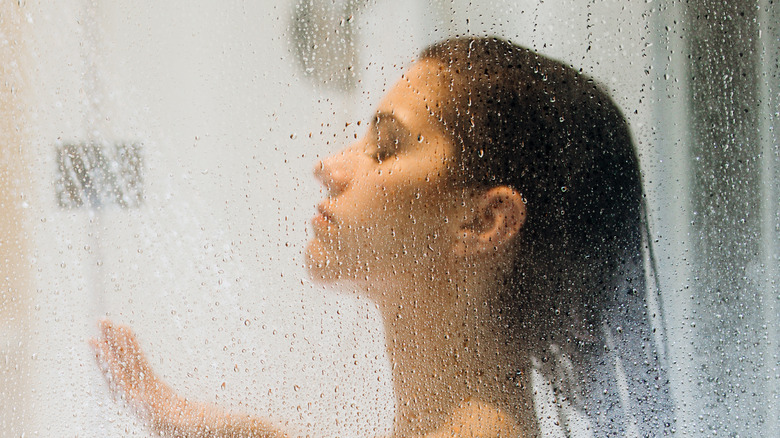Myths About Periods You Have To Stop Believing
The menstrual cycle is controlled by hormones produced by the ovaries and the pituitary gland. According to the Cleveland Clinic, these hormones cause the lining of the uterus to thicken in preparation for pregnancy. If pregnancy does not occur, the thickened lining is shed during your period. Your first period usually occurs around the age of 12, but it can occur earlier or later depending on when puberty begins for you. Menopause typically occurs around age 51, when your ovaries stop producing eggs and your periods become less frequent and eventually stop altogether.
There are a variety of menstrual products available to help you manage your period, including pads, tampons, menstrual cups, and period underwear (via The National Health Service). It's important to choose the product that is most comfortable for you and to change it frequently. Although periods are completely normal, there are many myths and rumors surrounding this bodily function. Here are some common myths you need to stop believing about periods.
Myth: You can't get pregnant on your period
It's a common misconception that you can't get pregnant if you have sex during your period. This is because your period starts just after ovulation, so some people think that this window of time does not allow for pregnancy to occur. While it is true that your chances of becoming pregnant are lower during this time of the month, it is still possible to conceive (via Medical News Today). The length of your cycle, the timing of ovulation, and how long sperm stay alive in your body can all contribute to pregnancy while you're on your period.
According to Healthline, it is still safe to have sex while on your period, but you should make sure you are using contraception if you aren't trying to get pregnant. There are many effective forms of birth control, including condoms, birth control pills, and IUDs. If you're unsure about what birth control methods are accessible to you, speak with your doctor or healthcare provider about your options.
Myth: You can't exercise on your period
Many people experience fatigue, bloating, and discomfort during their period. If you've ever tried to work out during that time of the month, you know how frustrating it can be to feel sluggish and unmotivated. While it's fine to take a break from exercise if you have severe cramps or nausea, working out can actually make you feel more comfortable overall. According to Healthline, moderate exercise can actually help relieve some of the symptoms of PMS, like mild cramps and bloating.
Mild to moderate exercise will be the most beneficial during this time. This includes exercises like walking, yoga, and light strength training. According to GoodRX, stretching can also be beneficial by improving blood flow and reducing tension. Unless you feel great while on your period, you should probably avoid high-intensity exercises like running and high-volume strength training. Ultimately, it's up to you to listen to your body and do what feels good. If you don't feel like exercising at all while on your period, that's totally fine too.
Myth: Your period should last exactly one week every month
No two periods are exactly alike, even for the same person. In medical terms, your menstrual cycle begins on the first day of your period and ends on the first day of the next period (via the Mayo Clinic). The average menstrual cycle occurs every 21 to 35 days (meaning your period comes every 21 to 35 days) and the average period lasts for two to seven days. Long cycles are typical in the first few years after menstruation begins, but as you get older, menstrual cycles usually get shorter and more regular.
If you don't fall into this pattern, don't stress right away. It's normal for menstrual cycles and period lengths to be longer or shorter than the time frames mentioned above. As long as your periods occur regularly, you probably have nothing to worry about. However, according to the National Health Service, irregular periods may be a cause for concern. In the years leading up to menopause and during puberty, irregular periods might be common. Your regular menstrual cycle may be thrown off if you switch your method of birth control. If you have irregular periods and aren't sure why, you should schedule an appointment with your doctor to see if there's an underlying health issue at play.
Myth: It's normal to have extremely painful cramps
Many people suffer from extremely painful cramps during their period. This has often been dismissed as a common issue, but it shouldn't. Cramping is normal during your period because of the uterine contractions that are necessary to expel the blood and tissue from your body. However, if cramping is so severe that it's interfering with your daily activities, then it's not normal (via Healthline). Health experts are unsure why some people have a higher risk of having painful period cramps, although risk factors can include being under the age of 20, smoking, reaching puberty early, and genetics.
There are a number of health conditions that can cause painful cramping, including pelvic inflammatory disease (PID) and fibroids in the uterus. According to Oregon Health and Science University Center for Women's Health, endometriosis is another condition that often causes painful periods. Endometriosis is a condition that occurs when the tissue that normally lines the inside of your uterus starts to grow outside of it. This can cause pelvic pain, heavy bleeding, and cramping. If you're experiencing any of these symptoms, it's important to see a doctor so they can properly diagnose and treat the condition.
There are a number of treatments available for painful cramps, such as over-the-counter pain relievers and heating pads. However, you should see a doctor if you have painful periods to rule out any medical conditions.
Myth: PMS is all in your head
PMS, or premenstrual syndrome, is a condition that affects women during the second half of their menstrual cycle. It is a very real condition that is not all in your head (via WebMD). Symptoms typically include mood swings, bloating, headaches, and cravings for certain foods. Some women also experience cramps and breast tenderness. PMS can range from mild to severe, and in some cases, it can be debilitating. The exact cause of PMS is unknown, but it is thought to be related to changes in hormone levels during the menstrual cycle, according to the Mayo Clinic. These hormonal changes can affect various parts of the brain and body, which can lead to the physical and emotional symptoms associated with PMS. Some women may be more susceptible to PMS due to genetic factors, or if they have a history of depression or anxiety.
PMS symptoms typically begin in the week or two before a woman's period and resolve within a few days after her period starts. For some women, however, the symptoms can persist throughout their entire cycle. If you're experiencing severe PMS symptoms that are interfering with your daily life, it's important to see your doctor. They can rule out other potential causes of your symptoms and recommend treatments that can help.
Myth: You can't eat certain foods during your period
There are a lot of old wives' tales about what you should and shouldn't eat while on your period. But the truth is, there is no one-size-fits-all answer to this question. Some women find that certain foods make their symptoms worse, while others find that certain foods help to alleviate cramps or other discomforts. Unfortunately, the foods you probably crave on your period, like sugary sweets and snacks, can actually make you feel worse in the long run (via the Cleveland Clinic). Of course, everyone is different and if you're craving a hot fudge sundae while on your period, go for it.
That said, there are a few general guidelines that may help when it comes to what to eat during that time of the month. According to Healthline, staying hydrated is very important. Be sure to drink plenty of water and eat water-rich fruits and vegetables. When it comes to food, try to focus on eating foods that are high in iron, as this can help with fatigue. Leafy green vegetables, legumes, nuts, and seeds are all good sources of iron. You may also want to try taking a supplement if you feel like you're not getting enough iron in your diet. Other foods to eat on your period include fish, ginger, dark chocolate, and nuts.
Myth: It's not safe to skip your period
While the main purpose of hormonal birth control is to prevent pregnancy, some people use birth control to treat painful or heavy periods. According to the Mayo Clinic, some types of hormonal birth control can be used to delay or skip periods. Different types of birth control will affect your period in different ways, so you will need to speak with your doctor about your health and birth control goals to find a method that best works for you.
Some people are afraid that using hormonal birth control can be dangerous. Overall, it is considered safe to skip your period with birth control (via Healthline). Having your period every month is not necessary for your health. However, birth control does come with many potential side effects including weight gain, nausea, headaches, and mood swings. You should always speak with your doctor before using birth control, as they will want to discuss the risks and help you decide which method is best for you.
Myth: You can't swim on your period
It is a common misconception that you cannot swim while you are on your period. This theory may have started before the tampon was invented, but you absolutely can swim while menstruating. The only thing you need to do is make sure you use a menstrual cup or tampon while you're in the water (via WebMD). This will help to prevent any leaks and will keep you more comfortable while swimming. You can also use period-safe swimwear if you have a light flow. Some people believe that it is not safe to swim in the ocean while on your period because sharks can smell menstrual blood. This theory has no evidence however, so there's no need to worry about this while swimming.
Swimming can actually be quite beneficial when you're on your period. It is a moderate exercise that can ease cramps and other PMS symptoms. The cool water will also feel good if you experience aches due to your period. While you don't have to swim on your period if you don't feel comfortable doing so, there's no reason to stay out of the water if you want to get in.
Myth: You can't get a perm until after your first period
Are you not supposed to get a perm until after your first period? This is a myth that has been passed down for generations, but it is not based in fact. There is no medical reason why you should wait to get a perm until after you have started your period. This myth may have to do with the fact that some chemicals can affect fertility by being absorbed through the scalp and skin (via WebMD). Because of this, perms are generally not recommended during pregnancy, especially during the first trimester of pregnancy.
However, there is no evidence to suggest that getting a perm before your first period will have anything to do with future fertility levels. That being said, perms do expose you to harsh chemicals and have a possibility of damaging your hair, so you should probably avoid them if you can. According to Healthline, a perm can weaken and dry your hair, especially if it is already prone to breakage. It can be a cute and fun way to change your hair, but be sure you know what you're getting into.
Myth: You should avoid hot showers while on your period
Some people believe that you should avoid hot showers while on your period because they can make your flow heavier. The thought behind this myth isn't totally crazy — heat can dilate your blood vessels and relax your muscles, two factors that can theoretically affect your period (via Healthshots). However, there is no scientific evidence that a hot shower will affect your menstrual flow in any significant way.
There are actually many reasons you should take a hot shower while on your period. Because heat relaxes your muscles, a hot shower can ease the cramping and discomfort that often comes during your period. You can experience similar benefits by using a hot water bottle or heating pad on your stomach to relieve period cramps. Soaking in a hot bath and even wrapping yourself in a warm blanket can offer similar benefits. If your cramps are significant and interfering with your daily life, speak to your doctor about ways to manage your pain.

